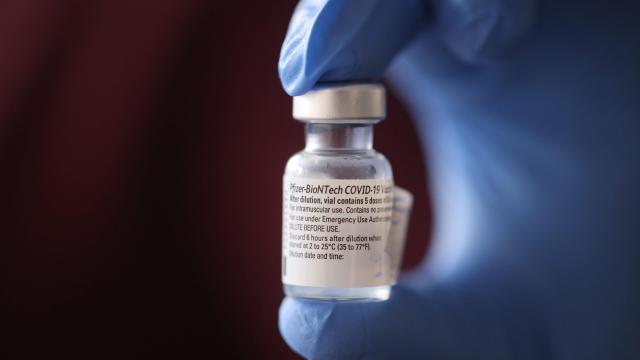A study looking at the impacts of covid-19 vaccination — condemned by other scientists as seriously flawed and irresponsible — has now sparked a mutiny of sorts. This past week, several well-respected researchers have resigned from their involvement in the journal that published the paper, which argued that vaccines are killing almost as many people as they’re saving from the pandemic. Today, the paper was retracted.
The study, titled “The Safety of COVID-19 Vaccinations — We Should Rethink the Policy,” was published on June 24 in the journal Vaccines and was authored by Harald Walach, Rainer J. Klement, and Wouter Aukema. Citing several sources of data, the authors argued that covid-19 vaccination was more dangerous than commonly believed, and that the benefits of inoculation only barely outweighed the risks caused by covid-19. Most egregiously, they claimed that for every “three deaths prevented by vaccination, we have to accept two inflicted by vaccination.”
The paper was uncritically shared by some on social media at first, including members of the anti-vaccination movement. But it was quickly criticised by many other scientists for its faulty assumptions, bad maths, and outright misinformation.
One of the main pieces of evidence the authors presented to support their claim that the covid-19 shots are deadly, for instance, came from the Netherlands’ adverse event reporting system for their vaccines. But as Gizmodo has discussed before, these systems are designed to record any health incident, including death, that occurs after a person receives a new drug or vaccine. They don’t demonstrate that the incident occurred due to the drug — after all, a person may die for any number of unrelated reasons after receiving a vaccine — but instead are meant to flag possible signals of undiscovered side effects that could be linked to a new drug or vaccine, signals that then have to be studied further before any judgment can be made.
It wasn’t long before scientists associated with the journal Vaccines began to protest the study’s publication. Within days, prominent scientists such as Katie Ewer, a member of the Oxford University team that helped create their now widely used covid-19 vaccine, resigned from the journal’s editorial board. A day after her resignation, the journal placed an expression of concern on the paper, meant to alert readers of the many criticisms it had received, and announced it would investigate the matter. The announcement didn’t seem to stop the bleeding, though; at last count, according to the publication Science, at least six scientists in total have resigned from positions as associate or section editors with the journal.
Finally, just today, Vaccines’ remaining editors came back with their verdict, announcing that the paper would be retracted. In their notice, they pointed to “several errors that fundamentally affect the interpretation of the findings,” including the misrepresentation of the Netherlands’ vaccine safety data. The editors also noted that the authors were asked to respond to the criticisms made of their paper, but “were not able to do so satisfactorily.” The paper was then retracted under their protest.
Even with this decision, some scientists have questioned how the paper got through the peer-review process in the first place. Two of the three reviewers were anonymous, and none brought up any of the issues that resulted in the retraction. The current fiasco isn’t the only one to have involved MDPI, the publisher of Vaccines and many other open-access journals. In its past, some scientists have accused MDPI of being a predatory publisher, more eager about the quantity than the quality of the research it publishes — criticisms that were still being made this year before the latest retracted paper.
“We have established procedures for handling all complaints about published papers, which were followed,” Damaris Critchlow, head of publication ethics at MDPI, told Gizmodo in an email. “The Editor-in-Chief and the journal conducted an investigation of the scientific concerns raised, ultimately resulting in article retraction. Our Editor-in-Chief, Editorial Board and the journal treated the investigation with utmost priority. We are in the process of consulting the Editor-in-Chief and Editorial Board to establish further ways to support our Academic Editors, who are responsible for manuscript acceptance decisions and for assessing the quality of the peer review reports.”
This debacle shouldn’t take away from the importance of confirming vaccine safety, though. We need to verify the data collected from clinical trials of any new medicine once it’s released to the public, even in the midst of a pandemic. But caution should be warranted if someone starts making extraordinary claims about safety or lack thereof — especially if those claims are based on adverse event reporting systems.
Oftentimes, adverse events aren’t related to the treatment at all, and it’s only when the risk of a particular event is plausible and higher than it would be in the general population that scientists begin to suspect a connection between the event and the drug. This has happened a few times with covid-19 vaccines, such as the now-established link between certain types of blood clots and adenovirus-based vaccines like the AstraZeneca/Oxford shots.
So far, all the risks associated with vaccination are either thought to be mild, short-lasting, or rare and manageable, and are clearly outweighed by the benefits they provide in preventing covid-19, a disease that has killed at least 4 million people worldwide in the past year and a half.
